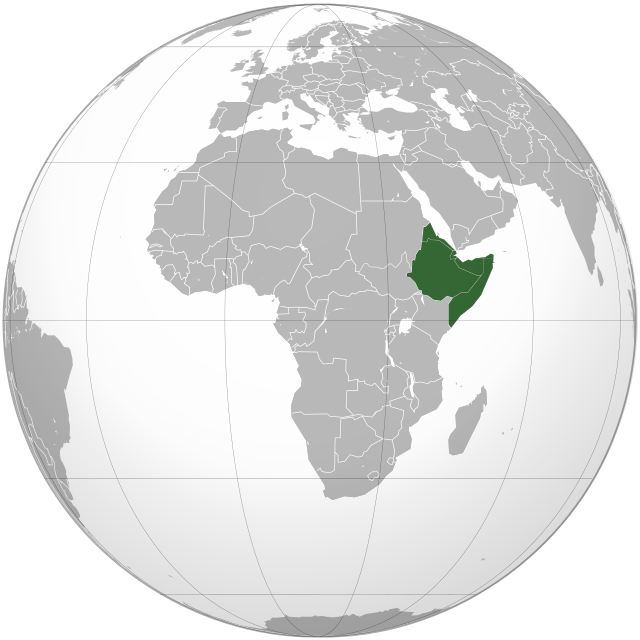CURRENT AFFAIRS UNIT, RADIO KWARA, ILORIN
PROGRAMME: NEWS COMMENTARY
DATE OF BROADCAST: 4/5/89 AT 1810 HOURS
WRITER: LANRE KAWU
Reports emerging from Somalia in the last week, speak of heavy fighting in the north of the country, between forces of the government of President Siad Barre, and the rebel forces of the Somali National Movement (SNM). These latest reports, duplicate the serious fighting this time last year, when the major northern population centre of Somalia, Hargeisa, fell to the fighters of the SNM.
In the counter-offensive that followed, Somali government forces were said to have gone on rampage. The city of Hargeisa, was all but destroyed. Human Rights groups reported that hundreds of innocent people were killed, while more than 100,000 people fled across the border into Ethiopia, in search of refuge. The latest outbreak of hostilities between government forces and the SNM, came in the wake of the reported mutiny within the ranks of the Somali National Army, which was sequel to the improving relations between Somalia and its old adversary, Ethiopia. It is being suggested that the elements in mutiny, could not accept that Somalia had quietly dropped its claim on the Ogaden Region of Ethiopia.
Across the border in Ethiopia, meanwhile, President Mengistu Haile-Mariam, was reporting to Ethiopians, during May Day, about the inconclusiveness of talks held over the past couple of months, between the Ethiopian Government, and members of the Eritrean Liberation Front. The main Eritrean movement fighting for independence, the Eritrean People’s Liberation Front (EPLF), had declined to take part in the said talks. For President Mengistu Haile-Mariam therefore, the was no alternative to more hostility, with its potentials of more dislocations, deaths and other deprivations for the people.
The problem in Somalia, can be traced to the generally bankrupt policies of the Somali Presidency of General Siad Barre. Policies which led to the adventuristic invasion of Ethiopia in 1978. It was a tragic culmination of the betrayal of the Somali revolutionary upheavals of 1969. That revolution jolted the whole of the Horn of Africa. An hitherto backward, and largely nomadic community, was beginning to assert its place in contemporary history. The Somali script was developed, literacy was encouraged, and basic institutions of people’s power were also evolved.
But side-by-side with the impressive developments went the undemocratic tendencies of President Siad Barre and his cronies. They unleashed a potentially revolutionary upheaval, but wanted it to move at their own pace. As society’s development proceeded at pace, the military junta of Siad Barre, proved more and more unable, or infact, incapable, of siding with its progressive pace. When Ethiopia was attacked, Somalia moved firmly into the imperialist orbit, and before long, it was developing links with the main enemies of free Africa, apartheid South Africa.
In Ethiopia, on the other hand, the Revolution of 1974 inherited some of the most complex social problems on the African continent. These included the inequality of nations, the colonial question in Eritrea, and the class inequities in a feudo-bourgeois society. The changes brought by the Ethiopian revolution, in literacy, land and agrarian reforms, urban housing, mass mobilisation, emancipation of women, amongst others, stand out as some of the most radical that the continent has ever witnessed.
Inspite of these truly remarkable successes, the Ethiopian government of President Mengistu, and the ruling Workers’ party, have not been able to record any significant success in ending the inequalities of the nationalities. The wars in Eritrea and Tigray continue a troubled and bleeding wound in the psyche pf this country, one of Africa’s oldest.
Clearly, the situation of war which has ravaged for almost thirty years in Eritrea, and the war in Northern Somalia, cannot continue forever. The peoples of the Horn of Africa, who have always been plagued by natural disasters, such as drought and famine, need a peaceful and democratic atmosphere to launch ambitious programs of development.
In this regard, the various government, must initiate genuinely democratic reforms, to pave the way for the solution of the various questions of democratic development, which can be the only genuine basis for the removal of mistrust between the nations and nationalities, making up these countries.
Afterall, it is not as if the Horn of Africa, with its population, it varied land and water resources, its rich fishing grounds in the Indian Ocean, and the strategic geopolitical location, cannot begin to win the battle against underdevelopment. But this will not be achieved, if the destructive wars of the last couple of years continue to consume resources and human lives in the Horn of Africa.


